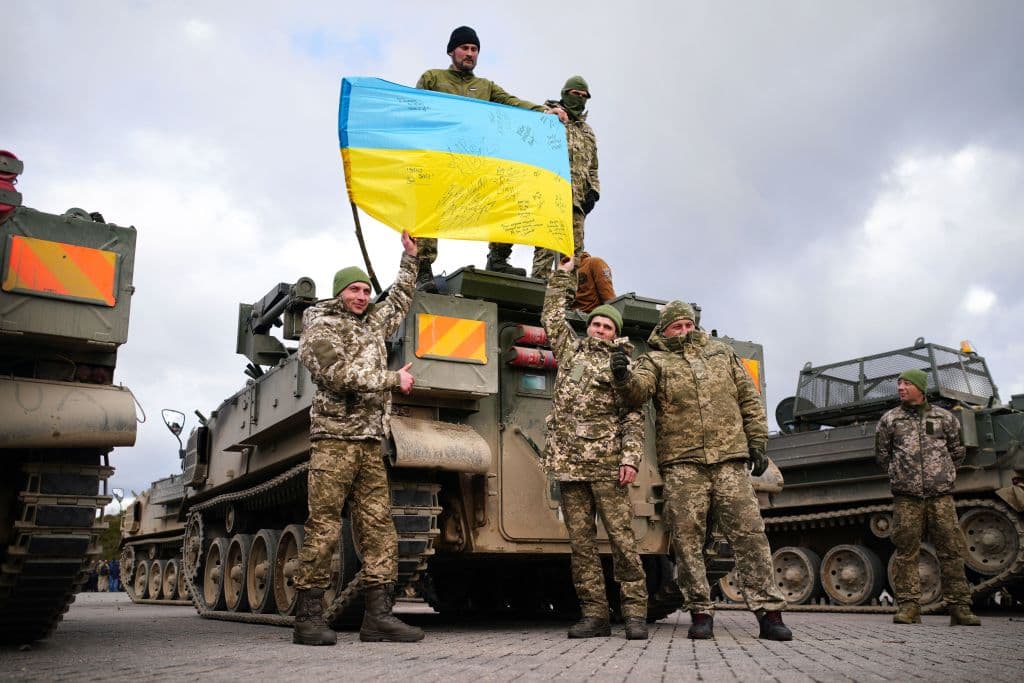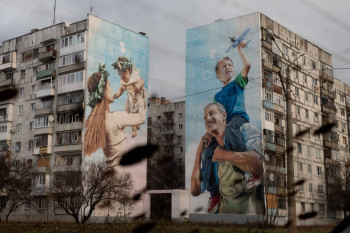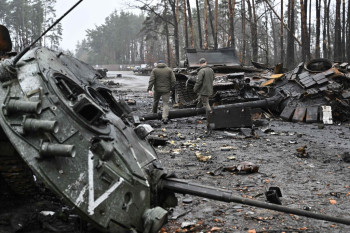Anton Shekhovtsov: A year after Russia’s invasion the West finally discovers what Ukrainians stand for

Editor’s Note: This article was commissioned by Voxeurop and republished by the Kyiv Independent with permission. The original published article may be found on Voxeurop's website. The opinions expressed in our op-ed section are those of the authors and do not purport to reflect the views of the Kyiv Independent.
Just two weeks before the most dramatic escalation of Russia's war against Ukraine in February 2022, colleagues from the Slovak think tank GLOBSEC asked me and other experts in the field to provide a short commentary on possible scenarios of the Russian aggression.
Readers will recall that, at that time, American and British leaders – informed by the intelligence provided by their agencies – were actively engaged in raising awareness among allies of Russian preparations for a massive attack against Ukraine, and, simultaneously, in attempts to dissuade the Russian leadership from implementing their malign intentions.
As Russia was amassing dozens of thousands of troops on the borders with Ukraine, I, like many other Europeans, hoped that Moscow’s sabre-rattling was not serious, and believed that although we could not dismiss the possibility of further Russian invasion of Ukraine, such a development was still the least likely scenario.
Those hopes and beliefs were underpinned by a rationalism that insisted that the Kremlin’s fear of crippling Western sanctions would convince the Russian leadership to think twice before making further incursions into Ukraine’s territory after several years of a low-intensity conflict in Russian-occupied parts of eastern Ukraine.
The same rationalism also maintained that Moscow would find it difficult to pay the incredibly high human cost of the escalation.
Moscow's 'moral concerns'
But that rationalism was in conflict with yet another, equally legitimate rationalism that renounced the well-minded considerations about Moscow’s presumed economic sobriety and moral concerns, and persisted that everything we knew about the Putin regime pointed at the inevitability of the Russian military escalation in Ukraine.
Why would anyone doubt – that rationalism inquired – the worst intentions of Moscow after it unlawfully and in violation of all international norms annexed Ukraine’s Crimea in 2014?
Why would anyone believe Russia’s assurances that it was not going to invade Ukraine after it lied about pretty much everything it had been doing in Ukraine since 2014?
The failure of practical rationalism to foresee the bloodiest war in Europe since the Second World War and the triumph of empirical rationalism – but, perhaps most importantly, the sheer scale of the tragedy of the Russian invasion – opened up a way of looking at socio-political developments in Russia before Feb. 24, 2022, through the perspective of what happened afterward.
When the Russian authorities impoverished distant Russian regions, driving people living there to destitution, were they not building a pool of socially desperate volunteers for the war against Ukraine?
When they encouraged producing films, books, and shows that derided the Ukrainian nation as a devious and treacherous people, and vilified Ukrainians proud of their national identity as backward fascists, were they not striving to facilitate future Russian war crimes in Ukraine through their dehumanizing efforts?
When they methodically eliminated – through intimidation, imprisonment, and murder – independent media, civil society, and political opposition, were they not preemptively destroying any sizable anti-war movement in Russia?
When they turned Russian prisons and colonies into a monstrous behemoth of torture, degradation and inhumanity, were not they creating the future cadre for cannon fodder to be used by the Wagner Group mercenaries and other Russian state-affiliated terrorist organizations?
When they fostered distrust among their citizens through sexism, hate, and normalization of domestic violence, were not they getting the Russian population ready to be turned into an obedient, alienated, and hopeless mass of people who would continue serving the civilian engines of the Russian war machine?
Practical vs. empirical rationalism
Guided by empirical rationalism, all these developments could have been unpacked even without a hindsight bias. Yet even the most ruthless version of that rationalism could hardly prepare us for the horrors that the Russians unleashed onto Ukraine during their genocidal invasion.
We could naturally expect the Russians to be indiscriminately killing Ukrainian civilians no matter whether they were ethnically Ukrainian or Russian or Jewish or whatever – this is what they had been doing anyway since 2014.
But who could expect that the Russian military would raze entire Ukrainian towns and cities to the ground on the territories that Moscow considers to be Russian?
Or we could unfortunately expect Russian invaders to be using rape of Ukrainian women and children as a weapon of war – after all, this is what their Soviet ancestors did when they occupied Central and Eastern Europe. But who could really imagine that Russian wives would themselves instruct their husbands to rape Ukrainian women?
Much of this bone-chilling surprise comes from our lack of knowledge of and expertise on Russia and its population.
Too many Western scholars transformed from objective researchers of Russian history, culture, and society into biased “Russia understanders,” if not overt Kremlin fellow travellers.
Too many Russian scholars lavished with Western grants, fellowships, and academic exchanges produced unjustifiably optimistic “research” with the aim of accommodating political aspirations of some in the West of the allegedly inevitable democratization of Russia.
Too many Eastern European scholars with deep knowledge of Russia failed to produce convincing research that would make its way to North American and Western European stakeholders without being dismissed as driven by historical traumas.
But what about our lack of knowledge of Ukraine?
And it was, indeed, the lack of Western expertise on the largest European country located entirely within Europe that had prevented the West from supplying Ukraine with much needed heavy weapons before the Russians escalated the war against Ukraine in February 2022.
Of course, in the course of 2022, the West supported Ukraine with artillery rocket systems, howitzers, anti-missile installations, and armored vehicles, but why had not Western nations done this before the escalation despite their intelligence that Russia was getting ready for the full-blown invasion?
The answer to this question – as we know today – is that major Western allies assumed that Ukraine would fall within three weeks and feared that heavy Western weapons would end up with the Russians, international criminal gangs, or terrorists. That was practical rationalism – the same that hoped for de-escalation in the Russian case, and dreaded a quick demise in the Ukrainian case were the escalation to take place nonetheless.
In contrast, empirical rationalism cried to tell the West and the world that Ukraine would resist and persist against all odds.
Ukraine’s history over the recent two decades was an empirical foundation for such confidence. Ukrainians successfully fought off – through peaceful and violent protests alike – all domestic attempts to turn their country into an authoritarian regime. Ukrainians were ready to sacrifice their lives for freedom against even homebred autocrats – how could anyone doubt Ukraine’s resolve to fight the foreign tyranny?
While the Russian leadership was wiping out the last remnants of political opposition in their country, the party-political life in Ukraine thrived, giving rise to a new generation of leaders who learned to value democracy and human life.
When the Russian population looked the other way as their authorities crushed down on religious and sexual minorities, Ukrainian civil society was building networks of solidarity to ensure that no legitimate social group becomes a victim of state repression.
Just as Russia was increasingly governed by fear, Ukraine pressed for dignity as the heart of governance.
It was a combination of Ukraine’s dignity, solidarity, and fortitude that not only made it possible for the country to ruin the Russian genocidal plans when the escalation started, but also inspired nations across the West to stand with Ukraine and its people. And as Ukraine is fighting on and winning the war with the help of its allies, the West is not only transforming itself but is also strengthening its positions in the world that will never be the same again.












